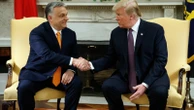Following the Trump administration’s cuts to foreign aid, two-thirds of Mercy Corps’ U.S.-funded programs have been rescinded. CEO Tjada D’Oyen McKenna shares how she’s leading her team amid immense pressure—scrambling to find new ways to help those in need, even as she resorts to layoffs to keep the business afloat. McKenna reveals what she’s hearing from her team of aid workers on the ground in Gaza, and why she isn’t running away from burnout but embracing it. Like many business leaders experiencing political or economic volatility right now, McKenna is faced with a complex conundrum: fight, flight, or freeze.
This is an abridged transcript of an interview from Rapid Response, hosted by the former editor-in-chief of Fast Company Bob Safian. From the team behind the Masters of Scale podcast, Rapid Response features candid conversations with today’s top business leaders navigating real-time challenges. Subscribe to Rapid Response wherever you get your podcasts to ensure you never miss an episode.
U.S. government funding accounted for half of your funding, right?
Exactly.
About two thirds of your programs were rescinded. I mean, it’s like an existential crisis, a true existential crisis for the organization. So what did you do? I mean, you faced a slew of urgent decisions.
They were urgent decisions, and I have to say it was very clumsy, right? Usually when you work with the government, there are definitions for every single thing, so very specific definition for stop or very specific definition for freeze. And in this case, the guidance wasn’t there. When they said we had to stop doing everything, our first concern was safety for people. If I have people in a remote area of a country or in charge of delivering food to a school feeding program next day, that community didn’t understand that we weren’t showing up the next day, and they certainly didn’t understand it was because the U.S. government told us not to, but we had to go to work.
Once it was clear what was going to be cut or what wasn’t going to be cut, we had to go about shutting down those programs across 40 different countries, lots of different labor laws to that. We consolidated some of our regions, we closed some country offices. We just got to work to say, “If the funding wasn’t there for that program, we’ll shut it down in the most responsible way possible and we’ll keep moving and then address what we have to do with the U.S. government to see what we can preserve, make sure our other funders are okay, and still be prepared in case if another hurricane or earthquake had hit during that period, we still had to be prepared to respond.”
I mean, the irony is your organization is all about responding to crisis when it emerges and now the crisis becomes you. And in some ways in some of these communities you’re sort of creating the crisis because they’ve become used to having you there.
Yes, yes, yes. And I worried a lot about staff safety, particularly in remote places where we were a source of survival for people where we provided access to food, and that continued to plague me. We’d hear reports from colleagues of government officials trying to stop their country director to make sure everyone got paid before they left. And my staff in Sudan, almost all of them are displaced from their homes themselves. So they’re working for us in temporary shelters, still going through the same problems that everyone else is going through.
And so this was a weird situation where our organization was the one that had to be the emergency patient, but we also knew . . . You almost felt guilty for feeling bad because people have it so much worse than you do. There were a lot of weird mental gymnastics that were happening for all of us.
We’re now months in, past that initial shock. How much do you look at 2025 today as an inflection point, sort of a new normal for USAID orgs like Mercy Corps? Are you kind of holding your breath in a way in hopes that, “A next administration maybe will reinstate things?”
No, we know nothing’s going back to the way it was, but we don’t know exactly what that looks like going forward. The other thing that was surreal is there was this demonization of aid or demonization of aid agencies. A lot of misinformation about the work we were doing and how we were doing it. And then there’s the third and fourth effect. So in a lot of places, we rely on UN airplanes to get in and out of certain areas, and so a lot of UN organizations we’re also facing the same U.S. cuts that we were. So we are still digging out of the aftermath. We know the world is fundamentally changed, and right now we are trying to embrace that and move into the future while also knowing the future’s still quite uncertain.
I have to ask you about Gaza. There are all the reports about famine in Gaza where you’ve had teams on the ground. Your Mideast director was on this show in October of 2023 soon after Hamas’s October 7th attack as the initial Israeli military action was underway. Are your teams still active on the ground there now? What are they seeing and what might our listeners be missing in the news reports that they’re getting?
We have about 35 staff that are still on the ground living and working in Gaza. We’ve had about 1,300 trucks stuck at a border that have not been able to get in. We’ve had some food in those trucks expire in that time period. And even without those trucks, our teams on the ground we’re working with water desalination plants and supplying clean water to people. It’s so dire right now. Our own team members are hungry. They are worried about where their next meal is coming from. We have a staff member that is able to go in and out, and she talks about the weight loss that she’s seen in her colleagues. About a million people are under evacuation orders in Gaza City. A lot of them, this is the fourth, fifth time they’ve moved.
And what’s different lately, which really concerns us, is that sense of hope is really eroded. I think people feel like they’ve been just left. This is as tough as it’s ever been, and our own staff are fighting for their own survival. We talk about the lack of food, but 95% of households there just don’t have enough water. And so someone said, “A choice you’re making every day is, do I wash my hands? Do I drink a glass of water? Do I bathe the kids? The little water I have, what do I do with it?” And we just can’t imagine. It’s just been horrific and to feel so powerless, especially when we know there are trucks waiting across the border that could get in.
There are people like us that are really eager to do the work, like my staff who are looking for food themselves, who want to get out and do things, and we just know it’s political will that’s stopping that.
I spoke to another humanitarian aid leader recently off the record, who shared that starting years ago, they chose not to provide services in Gaza because they were worried and believed that Hamas would inevitably infiltrate their efforts. And obviously this is what the Israeli government or military at least is kind of saying, did you have worries about that? Does that matter when you’re trying to just feed people?
Gaza has always been one of the most difficult places in the world to work. I mean, we all are under U.S. anti-terrorism laws. Our staff are vetted. We check the names, we check the lists because the risk of having a staff member be a part of Hamas is too great to bear. We have not seen mass aid diversion from Hamas. That just has not been our experience, and most of our colleagues have not experienced that either. So that has been talked about as a threat. You do see looting, you do see hungry people, crowds of hungry people swarming to every truck and you see children and people throwing themselves in front of trucks. The way to address people stealing aid or making food valuable is to flood the zone with food, and then it’s not as valuable.
I think more importantly, there have been anonymous Israeli defense forces in COGAT, which is the border authority officials saying that they’ve seen no mass aid diversion. U.S. government reports, internal former USAID audit reports said they have no evidence of mass diversion of aid. So we work in difficult environments and we all take vetting very seriously, but we know how to do this. We know how to work in these environments.








No comments